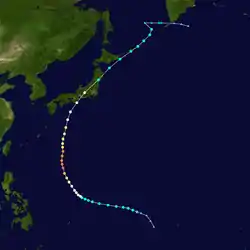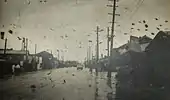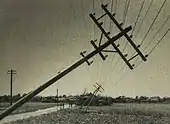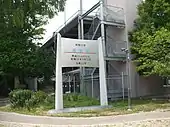Typhoon Tess (1953)
Typhoon Tess, known in Japan as "ja:台風テス" or "台風13号" or "Typhoon No. 13 of 1953" was a typhoon that caused great damage to Japan (especially the Kinki region) in September 1953 while Japan is still in the middle of post-war recovery.[1][2][3] The name 'Typhoon Tess' has been attributed to eleven other tropical cyclones.
| Category 5 super typhoon (SSHWS) | |
| Formed | September 17, 1953 |
|---|---|
| Dissipated | September 27, 1953 |
| Highest winds | 1-minute sustained: 280 km/h (175 mph) |
| Lowest pressure | 900 hPa (mbar); 26.58 inHg |
| Fatalities | 393 dead, 85 missing |
| Areas affected | Japan |
| Part of the 1953 Pacific typhoon season | |
Meteorological history

On September 16, a weak tropical cyclone was formed in the eastern Caroline Islands.[4] It remained relatively weak until around the September 21, but on the 22nd it strengthened rapidly. The pressure of Typhoon Tess was 993 millibars (29.3 inHg) at 9:00 (JST) on the same day, and dropped to 900mb at 15:00 JST.[5] Such a sudden increase in power is extremely rare. This pressure drop corresponds to the largest of Pacific typhoons since 1951.[6][7] Tess finally crossed the Shima Peninsula and made landfall to Aichi Prefecture on the September 25.[1]
Impact
The number of people killed by Tess was 393, while 85 were missing.[1][3] Japan suffered some large-scale disasters with more than 1,000 of casualties. When compared to the June 1953 North Kyushu flood and Kishū flood, the damage caused by Typhoon Tess was relatively mild but still destructive, with 86,398 houses are destroyed, 495,875 flooded houses, 318,657 hectares of damaged agricultural fields and 5,582 damaged ships.[3]
 Typhoon Tess at Osaka |
 Typhoon Tess at Tokyo |
 Typhoon Tess at Aichi prefecture |
 Typhoon Tess at Aichi prefecture |
 Sign indicating the flood level by Tess in Kyoto |
The Coast Act
Storm surge damages caused by a large number of typhoons were interfering with Japan's post-war recovery, especially Typhoon No. 13 of 1953.[8] The history of Japan's modern typhoon-induced coastal disaster prevention works began with Typhoon Tess in 1953 and led to the enactment of the Coast Act in 1956.[9]
References
- "台風第13号 昭和28年 (1953) 9月22日~9月26日". www.data.jma.go.jp (in Japanese). Retrieved August 30, 2020.
- "デジタル台風:台風195313号 (TESS) – 災害情報". agora.ex.nii.ac.jp (in Japanese). Retrieved August 30, 2020.
- "Digital Typhoon: Typhoon 195313 (TESS) – Disaster Information". agora.ex.nii.ac.jp. Retrieved August 30, 2020.
- A Synoptic Verification of the Development of a Tropical Cyclone into a Severe Typhoon – J-STAGE (The date of access : 2020/08/31)
- "デジタル台風:台風195313号 (TESS) – 詳細経路情報(Google Maps版)". agora.ex.nii.ac.jp. Retrieved August 31, 2020.
- "Digital Typhoon: Typhoon List". agora.ex.nii.ac.jp. Retrieved August 31, 2020.
- "デジタル台風:過去もっとも急速に発達した台風を知りたいのですが、どのように調べればいいのでしょうか? – レシピ集". agora.ex.nii.ac.jp (in Japanese). Retrieved August 31, 2020.
- "Preparing for Coastal Disasters by Taro Arikawa". Chuo University.
- "Lessons Learned from Storm Surge Disasters and Technical Issues on Countermeasures in Japan by Hiroyasu Kawai" (PDF). Port and Airport Research Institute, National Institute of Maritime, Port and Aviation Technology.